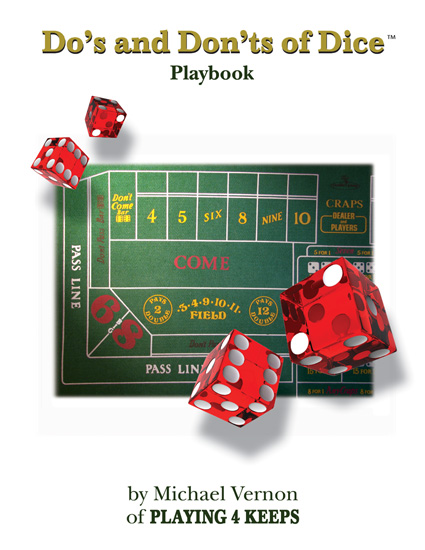|
Looking for an Exit...From the Castle
BY: Michel Vernon
One of my early lessons about casino games came from my mentor Stuart Wilde. The lesson was simple enough, "know your way around the casino". It, however, contains five sub-parts; know the location of the game, the cashier, the restroom, the bar, and the exit. The five parts aren't necessarily listed in any order of importance. However, sometimes it is cheaper to skip the game and buy a drink at the bar. Did you ever play a tough game, and end up paying $177 for two beers? Don't ask!
It was maybe three years ago; I was having a drink with the Dice Coach at Green Valley Ranch, after playing blackjack. We did okay in the session and I was first to color up, calling it quits. Dice Coach wanted to know why I left the game when I did. My reply went something like this, "I am looking for reasons to leave a game. Reasons to continue to play should be obvious enough." I don't recall now what it was, but something happened in the game that tipped me off that it was time to leave. Dice Coach confirmed that the game deteriorated after I left the game.
Have a look at "Today's Wisdom", following this article. This short excerpt may be the best strategy in or out of a casino. I thought I might dissect the lesson, as I understand it, and explain how it can apply to gaming.
Ask yourself:
* What is your motivation for playing a casino game?
* What is your level of commitment?
* What do you really want as the end result?
The answers will vary from player to player, so what is the point here? Self-awareness happens by answering the questions. Take some time now to come up with your honest answers to the three questions above. As easy as it may appear, once you set upon the task, it might take you to a deeper understanding of yourself as a player. Figuring out your motivation may evade you at first, when it comes down to writing it out in words. Oh sure, "to win money" is most likely to be the number one reason. But is it really? Scrape away the warm and fuzzy obvious answer and dig down a little more to uncover the inner reasons for why you play.
Your level of commitment is equal to your intestinal fortitude. Do you have what it takes? Do you want to expend what is necessary to succeed? For example, what does it really take to become a skilled dice influencer? How many hours of practice and casino play will it take to master the skill? The answer will not be the same for each player because we all have different abilities, understandings and conceptions. The universal answer could be, "I will do whatever it takes to achieve my goal." The hitch is that complete commitment is lacking in our culture. The tendency is to quit before achieving completion and end up settling for less. Sometimes we settle for less out of boredom, but mostly I feel it is from past conditioning that it is okay to do less than our best. Excellence is admired, but mediocrity is almost the standard and norm. So, without 100% commitment to a goal, it is more likely to fail than it is to succeed. Since failure is familiar, and we are use to it, we accept it. Oh, well!
Is winning the answer, or is the goal to just to have a good time? Wanting to win, in itself, is not enough. Wanting lacks intention. It can be negative yearning, which actually pushes the goal away. Having a good time is easy enough for us to justify and write off with acceptance. At least I had fun... losing. In the end, when playing a zero sum game with the odds against you winning, answering the third question makes it as tough to be honest. What do you really want as the end result?
The "Quickening", as it is referred to, has to do with sharpening your senses and your perception of reality. It takes practice, patience and a level of commitment. The "Quickening" is similar to learning a new language or perhaps playing a musical instrument. It is through the speeding up of your etheric, that you are able to touch into other dimensions and perceive information. Your learning curve quickens with practice after achieving a certain amount of information.
Chasing a game, moving casino-to-casino is expending energy. It may be necessary, in order to find the right game, but you must be aware that you are burning energy in the pursuit of the right path. For those of you familiar with my strategies, you may be wondering if this is contradicting what I have said about hunting the game, it is not. I am clarifying that, although it is important to position yourself in a "best scenario" situation, you may burn energy in the process. Consider this as a caution note. As you use up your energy looking for a game, you may become frustrated finding no game, and you chose to play just the same. The decision to play happens out of frustrating and a feeling helplessness. Discipline is lost and inefficiency sets in as a result. All that you know about using energy is discarded and you play, simply because of wanting to play. (Check what you wrote down for your motivation to play.) Playing desperate, playing tired playing to play, because you want to, will usually end up with you in "poverty and struggle".
This leads me back to the opening of the article, which speaks about the exit. It is easy enough to look down at your chips and see that you are winning. When you are winning, it is like "easy money". Everything you do is working and paying off just fine. The reason I am always on guard for the exit is to protect my winning session. One of my many goals for a game is to keep as much of the money won from the game as I possibly can. I play for that challenge, keeping the money. I am not keen on losing half of what I have won by continuing to play long after "the game" is done. It is not my goal to write in my journal, "I could have won more if I had quit at the right time." Like following the stock market, I want to get in low and sell at the top. Being on guard for the time to exit supports my goal for keeping what I have won. It is my motivation and commitment to be on the alert for any subtle shifts in the energy that provide me with a hint to exit.
When it comes to gambling, anyone, anytime, can walk up and play any game. When it comes to capturing the castle, it is not just about the attack, it is about making it to the exit with full pockets.
Copyright (c)2007 Michel Vernon
www.playing4keeps.com
Click Here to return to the list of prior articles ...
|
 |










